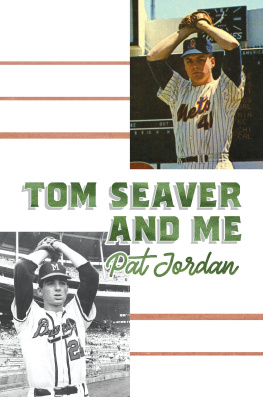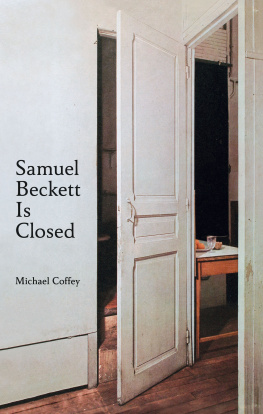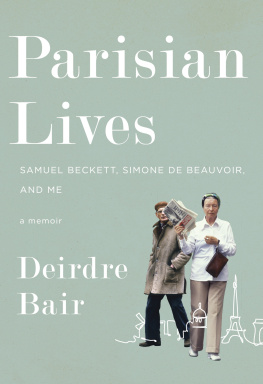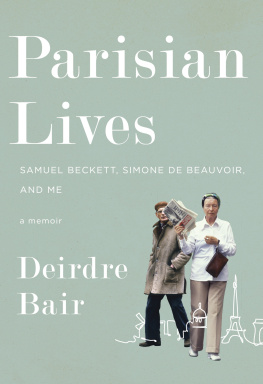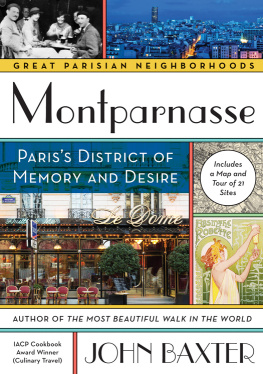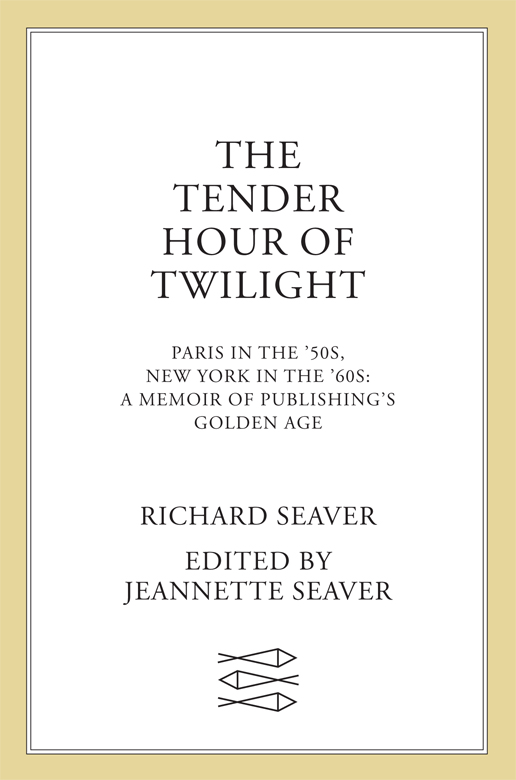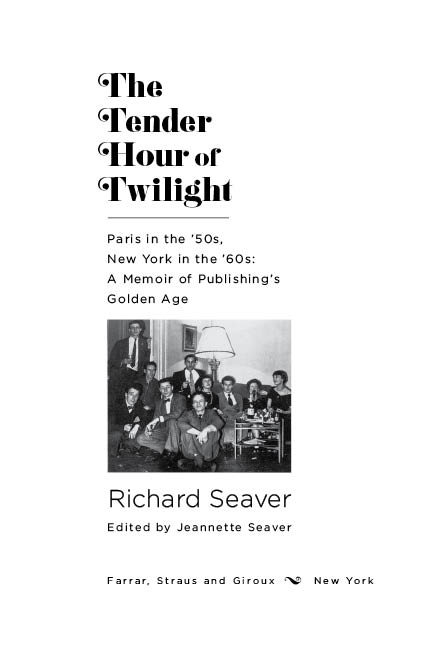
To Jeannette, my beloved,
without whose persistence, encouragement, patience,
resistance to my resistance,
and enduring love
this book would never have been
and
To Nathalie, Alexander, and Nicholas,
the lights of my life
Certain things I remember exactly as they were. They are merely discolored a bit by time, like coins in the pocket of a forgotten suit The myriad past, it enters us and disappears. Except that within it, somewhere, like diamonds, exist the fragments that refuse to be consumed. Sifting through, if one dares, and collecting them, one discovers the true design.
James Salter, A Sport and a Pastime
Contents
Part One
Part Two
Introduction
RICHARD SEAVER, EMINENT EDITOR, publisher, and translator, belongs to what is now thought of as a better time in American publishing, a period from, say, 1920 to 1950. Though he followed it by a decade or more, he personally carried on the legacy of a number of houses founded in that earlier time that reflected the tastes and character of individual owners. Writers might find a place to sleep, if necessary, in their publishers offices, and some might be given a monthly stipend.
Seaver had graduated from the University of North Carolina, taught Latin at a prep school in Connecticut, and then gone to Paris to study at the Sorbonne in the years just after the war. There he edited with some friends a literary magazine called Merlin , and on his own, reading him in the original French and being overwhelmed by the simplicity and terror, discovered Samuel Beckett, whom he later met, published, and remained good friends with for the rest of Becketts life.
In 1953, toward the end of the Korean War, he was called into the navy and served a tour as an engineering officer on a cruiser. When I first met him in Paris in 1961, he was a senior editor at Grove but still looked like a naval officer, capable and tough. I asked him once, out of curiosity, what he had known about engineering.
Nothing, he said simply.
In Paris, he and his wife were glamorous sans effort . They knew everyone in town, it seemed.
In New York, he started his publishing career working at George Braziller and soon afterward went to Grove Press, where he remained for eleven years, from 1959 to 1970, years of great turbulence and importance. He became editor in chief.
Grove Press began publishing European avant-garde writers and political thinkers, Beckett among them. American literature, not uniquely, had for a long time been under moral constraints, as exemplified by Theodore Dreisers realistic novel Sister Carrie being quickly withdrawn from circulation in 1900 by Doubleday when Mrs. Doubleday found it distastefulthe heroine lived in sin with a man and then repeated the offense. Books considered actually obscene could not be published in or brought into the United States. This included D. H. Lawrences Lady Chatterleys Lover , first published in 1928, privately printed in Florence, Italy, and banned in England and the United States. Its theme, that the individual is fully realized only when both body and mind flourish, was not sensational, but its sex scenes, with their candor and the use of the forbidden word fuck, kept the book underground.
There was an invisible fault line growing, however. Six years after Lady Chatterley , in 1934, Henry Millers remarkable Tropic of Cancer was published by the Obelisk Press in France. Written in the Paris of the Depression years, when the franc had fallen to almost nothing and a dinner with wine could be bought for a dollar, it was a view from the depths, seething with sex and life, and it gradually acquired a legendary reputation. It had even greater cachet after the war, and college girls returning from France smuggled it in, hidden among their underclothes. Customs would confiscate it or worse; in the case of publishers, far worse: Jacob Brussel, who dared to publish it in New York in 1940, went to prison for three years.
* * *
Soon after Seaver arrived, Grove Press boldly published Lady Chatterley , followed by Tropic of Cancer . They were not the first books to challenge, in whatever form, the prevailing laws, but they were the ones, along with Fanny Hill , to spearhead the court battles. The decade of cultural and sexual revolution was at hand, and the verdict of a federal appeals court that Lady Chatterley was not obscene marked a decisive moment.
With Seaver, a new wave swept in: William Burroughss Naked Lunch in 1962, Jean Genets Our Lady of the Flowers in 1963, Hubert Selbys Last Exit to Brooklyn in 1964, and in 1965 Story of O may be said to have contributed significantly to shaping the modern sensibility toward art and sex. Soon after, Grove published important political writers like Malcolm X, Frantz Fanon, and Rgis Debray. Over the years, Seaver himself translated more than fifty books from French into English, including works by Marguerite Duras, Andr Breton, and the Marquis de Sade. Present-day painting, sculpture, and even dance would not exist without the literature that foretold them.
A publisher is known by his writers, and at Grove, then at Viking and Holt, Rinehart and Winston, and for the last twenty years of his life at Arcade, which he founded and ran with his wife, Jeannette, Seavers writers were generally distinguished and significant, often foreign and sometimes lesser known, for example Andre Makine and Ismail Kadare, though they included Harold Pinter, Octavio Paz, and John Berger. There were possible Nobel laureates but modest sales.
As befits an editor and translator, Seaver had an even temperament and was low-keyalthough anyone would seem to be, compared to Brendan Behan, who literally barged into Seavers life in Parisand it was better to be low-key at the violent 1968 Democratic Convention in Chicago, where Seaver and his wife were trying to shepherd an illegal Jean Genet through the police charges and general chaos.
There has been a lot that has changed dramatically in American culture since 1950, when Lady Chatterley was thought to be a moral danger to society and Burroughs and Allen Ginsberg were lepers. All this and more is in these revealing pages, as well as the character, charm, and New Englandbred integrity of Richard Seaver in his long, distinguished literaryand also personallife.
JAMES SALTER
Foreword
ANYONE WHO KNEW DICK SEAVER will know that he was a man of exceptional modesty, in spite of his stature as a giant of the publishing and literary world. I have to admit that it took relentless hounding from his family to get him to record for literary history his remarkable years in Paris and New York in the 1950s and 1960s. When Dick finally started writing his memoir, he did so in the stolen interstices of a busy life, late at night, or on weekends now and then. He wrote for himself, he insisted, never intending it for publication. My extraordinary husband of many decades devoted his long career to discovering, reading, editing, and nurturing new voices. He loved his work. I noticed, however, that as he got down to the serious business of writing his memoir, each time he emerged from the privacy of his study, he would repeatedly declare how happy and energized he was to be going back to writing. Writing seemed to fulfill him in a way I had not seen before. Early on, back in Paris in the 1950s, Dick had written novels and poetry, not to mention his three-hundred-page thesis on James Joyce and the interior monologue. Discovering Beckett, however, was for Dick an overwhelming event, a kind of intellectual explosion. It stopped him short. From then on, it seemed, Dick felt unable to pursue his own writing. His muse turned silent.


